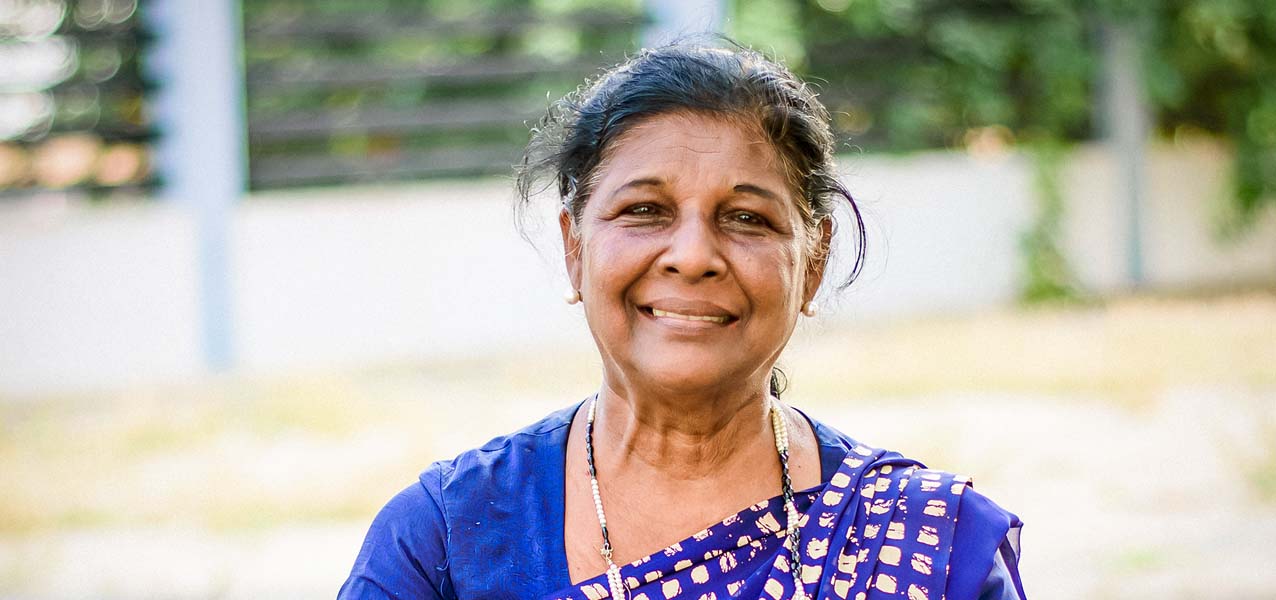From Where I Stand: “Women and girls need to know their rights so they can be self-reliant”
Winifrida Elizabeth Nawaratne is a human rights activist and an active member of the National Peace Council of Sri Lanka. She became engaged in social work following a course on human rights at the University of Colombo, which she took after retiring from her job as a typist. She was a participant in UN Women’s multistakeholder dialogues titled “Promoting Women’s Engagement in Effective Solid Waste Management in Sri Lanka”. Winifrida dedicates her time to promoting women’s rights and women’s empowerment in her community in Puttalam, north-western Sri Lanka.Date:

I never realised that there existed a big gap in education and awareness about basic human rights within our own communities, until I had the opportunity to speak with different people, especially women, as part of my work in advocating for human rights. Limited access to information, poverty, and lack of awareness are among the many factors that put women and girls, especially in rural areas, at increased risk of violence. Such situations even lead to instances of child marriages. Preconceived notions that a woman’s role should be limited to household chores and taking care of a family hinders their full potential to become leaders in their communities and the world over.
During one of my field visits, a 16 year-old girl asked me, “Why don’t we have human rights as a subject in school? Soon we will go into the world and start a family. If we know about our rights, we will be able to live better lives”.
This rang so true to me. When it comes to rights, there is clear discrimination against women, on different aspects of their life. Knowing what your rights are, in relation to your health, your education and your right to work is so important. Only then can we expect men and boys to recognize women as equal counterparts in society, and as those who take more than the role of just their sisters, mothers, and daughters. Only then can we shape their attitudes to look at women as leaders who can make a difference in their community.
Recently, UN Women and Chrysalis in Sri Lanka held a multistakeholder dialogue on waste management in my area. Many women who attended realized that they too have opinions that matter, and they too can contribute to making decisions in relation to community issues such as these, which affect people’s right to a clean environment, and right to live healthy lives. These dialogues also brought to light effective ways in which women can be empowered through self-employment by recycling waste to make an income. When women are given such knowledge, they can go far in life. What I hope to do with this knowledge is to create awareness among women in my community, so that they can also engage in self-employment and earn an income through such initiatives.
In a post-pandemic world, I hope that we would turn away from the modes of pre-pandemic life. When we stand up for human rights of women and girls, we are standing up for everyone. Through my work, I will continue to educate young children and challenge harmful perceptions so that we can create an equal world. A world that pushes back on discrimination and recognizes women for their capabilities and includes them in decision-making processes that affect their lives.”
The article is prepared within the project titled ‘Promoting Women’s Engagement in Effective Solid Waste Management’ convened by UN Women together with local CSO Chrysalis and UNOPS in Sri Lanka, with support from the UN Peacebuilding Fund. The project aims to bring communities together to provide solutions for a shared environmental issue and empower women by supporting their engagement in governance mechanisms.
UN Women acts to empower women and girls across all its programmes and advocacy. With stepped up action on gender equality, every part of the world can make progress towards sustainable development by 2030, leaving no one behind.